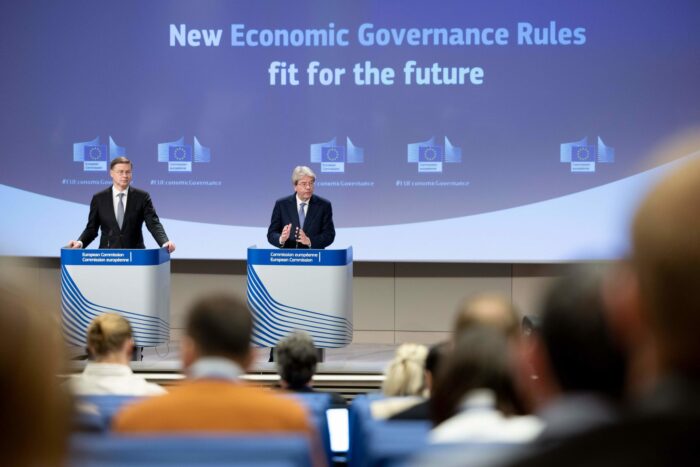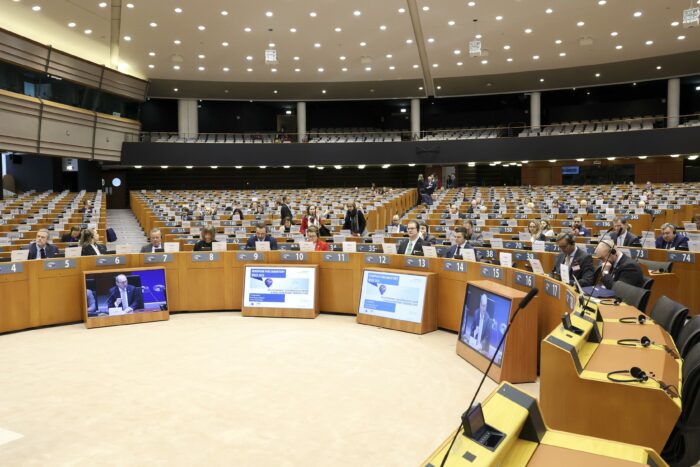The Progressive Post
EU economic governance needs a champion and a package solution


The EC has proposed measures to reform the EU fiscal rules. But in their current form, these measures risk producing a watered-down non-solution. Their one-sided fixation with fiscal sustainability, without considering other policy areas that depend on fiscal capacity, may undermine the European economy and the green transition. The EU must approach its economic governance reform as a coherent package, in tune with its other goals, and moving towards a fiscal union. Yet no political leader wants to champion the restyling of the EU economic architecture.
The current discussion on the reform of EU fiscal rules shows substantial differences among member states. The frugals’ insistence on benchmarks and safeguards in the Stability and Growth Pact (SGP) runs counter to the needs of others who do not have much fiscal space for investment. As serious negotiations kicked off after the summer break, finance ministers from Germany, Austria, Luxembourg, Switzerland and Liechtenstein made a call for a ‘return to fiscal normality’ after the more expansive fiscal policies that were enacted to combat the effects of the pandemic and the energy crisis. The recent decision of the German Constitutional Court prohibiting the use of €60bn of pandemic emergency funds for industrial policy is going to harden Germany’s position further.
As Buti and Fabbrini state, a good option for the EU to ensure an economic, political and institutional equilibrium on the fiscal framework would be to have a set of binding fiscal rules for national budgets, attached to a European central fiscal capacity. Tight rules without a fiscal capacity are not an economic equilibrium, whilst a fiscal capacity without rules is a political non-starter.
This current reform of EU economic governance is at best a reform of EU fiscal rules for the control of national fiscal budgets. Currently, there is no real debate or proposal on the table concerning the future of joint borrowing and the EU’s investment capacity. Why is the EU discussing fiscal rules separately from fiscal capacity? Should the two negotiations not progress together for a more balanced economic governance? The Commission has opted for a two-step approach, according to which there should first be a deal on public debt targets and sustainability, and only then a political discussion that can (perhaps) move to common European spending. It is unclear, however, whether this second step will ever materialise. In the meantime, the aspiration to launch a European Sovereignty Fund to finance industrial renewal and the twin transitions from 2026 onwards has been neglected, and the proposal abandoned.
Maybe a more relevant question for progressives would be why there should be agreement on the first step – the fiscal rules – if there is no engagement towards building a common European investment capacity? Would it not be possible to leverage the need of the frugals to control and cap national budgets, and at the same time to strike a deal for the continuation of the joint borrowing exercise financing the Green Deal Industrial Plan for Europe? In reality, one of the first big decisions of EU leaders to finance the Green Deal Industrial Plan was not that of building a new European resource but that of dismantling the European state aid framework, so that the better-off member states, with strategic and financial capacity, could speedily invest in their industries.
One of the problems we anticipate with the agreement that is about to be reached on new EU fiscal rules is that it might inhibit the ability of certain EU member states to achieve their green investment targets. The upcoming agreement might also inhibit the ability of certain EU member states to modernise their infrastructure, and to ensure that potential growth and competitiveness remain high in the coming decades. As often happens, countries that need more investment instead risk being more constrained by the fiscal rules.
The European Commission’s analysis in the European Semester package suggests that 14 member states will not fulfil the deficit criterion in 2023. Furthermore, estimates from the New Economic Foundation show that only four countries (Ireland, Sweden, Latvia and Denmark) will be able to meet the EU’s 3 per cent spending target on green investments while staying below the 3 per cent deficit threshold.
It seems that while arguing about thresholds and safeguards, EU policymakers are losing sight of the purpose: to keep public debt and deficit within certain limits. The IMF’s website says that “fiscal policy is the use of government spending and taxation to influence the economy. Governments typically use fiscal policy to promote strong and sustainable growth and reduce poverty”. With this definition in mind, policymakers should not be asking ‘How much money can we afford to spend?’, but ‘What does the economy need and how can we shape our fiscal policy to achieve it?’
In addition, EU leaders should reflect on the purpose of EU economic governance. Why have a European fiscal framework? Is it to ensure debt sustainability in the short and medium term or to build a solid European economy? It is not difficult to see that the macrofinancial and political stability of EU member states depends not only on their deficit, but also on their ability to put public investment to work for the sustainable development of their economy.
The way forward is to focus on the goals that Europe wants to achieve in different policy areas – energy, defence, health – and then to design the fiscal policy and rules accordingly. This means that fiscal plans and rules should be coordinated with the demands of other policy areas, in a coherent package. In addition, they should be plans and rules that do not destroy the (quasi-)level playing field that competition policy has created, and that are consistent with the convergence, territorial and social cohesion (the key transversal objectives of EU action).
A compartmentalised approach with separate negotiations for own resources, fiscal rules, green industrial policy, state aid and investment capacity may lead to a lack of coherence in the economic architecture of the Union. When countries try to agree on each policy separately, the inevitable outcome is the lowest possible denominator on which everyone can agree. This watering-down of policy proposals is a drag on the EU capacity to deal with urgent challenges. Each specific policy affects member states differently, with some of them gaining more, others gaining less, and some even losing. The traditional smart approach in politics, and especially in the EU, is a package approach, where diverse policies are agreed upon together. Shahin Vallée and Guntram B. Wolff, for example, refer to the need for a ‘grand bargain‘.
It is not clear why a package approach is not used to discuss EU economic governance at large. While it is entirely clear why certain member states have no appetite for this, it is less clear why none of the others take the issue of EU economic governance seriously enough to design a political trajectory that allows a bargain bigger than that of negotiations on the technicalities of the debt sustainability analysis. The EU is still looking for a champion of EU economic governance or at least for a coalition, like the one that was attained, almost overnight, for the NextGenerationEU package, and for which everyone now takes credit.
Photo credits: Shutterstock.com/Ronnie Chua




